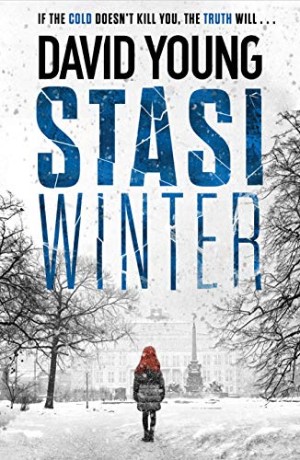
Written by David Young — Stasi Winter is the fifth novel in the Stasi series featuring Karin Müller of the People’s Police in East Germany. It is 1978 and the country is enduring a notoriously cold winter. Müller is the single mother of young twins, sharing their care with her grandmother. She is hoping to extricate herself from the police and take up a position as a teacher but her superiors have other ideas. They use her state-provided accommodation, the home of her family, as the bait to keep her in post.
When a woman is found dead from hypothermia in a small coastal town, Müller and her colleagues from Berlin are sent to investigate. It might have been an accident, but their involvement suggests someone influential has an interest in the case, and that the truth is less than straightforward.
The investigation also follows the point-of-view of another character, Irma, the Stasi Child of the first book in the series. She is now a young woman, living an apparently quiet life with her grandmother. She becomes involved with Dieter, one of a group of young men who are posted to the area, working in a construction brigade because they have refused to fight in the army. Together they make plans. When Irma and Müller’s paths cross again, more of her story emerges. Their complicated shared history means there is both hostility and a recognition that the two women are, in different ways, equally entangled in the regime.
It becomes clear who is responsible for the murder and why quite early in the novel, and the story takes a turn towards action and adventure rather police procedural as Müller and her team are involved in a dangerous cat-and-mouse with those responsible in the frighteningly icy conditions.
The cold in this novel is almost a character in its own right. It is vividly evoked by Young, in its beauty and its horror, and has a crucial part to play in the plot. It can be a murder weapon, and an adversary as powerful as any individual or the institutions of party and state. Climate and geography both play crucial roles as the sea freezes offering treacherous conditions but also the possibility of escape on foot to the West.
Stasi Winter is full of period detail and atmosphere. Müller’s situation at the beginning of the book highlights the difficult position she is in within the regime. It captures the ambiguity that is both like and unlike that experienced in the West. While detectives in procedurals often find themselves at odds with their superiors, Müller is also confronting different institutions of the state as they fight each other. Müller and others in the book, though, also see the other side of life in the West and reconcile what they experience with the illicit glimpses of West German TV which they see.
The novel brings in characters from previous books, not only in Müller’s team but in other elements of the plot. This is clearly explained for those who are new to the series – perhaps too much at times – as are Müller’s thoughts and motivations. The writing is strong enough that readers can draw the inferences themselves.
This is a powerful story of confinement in all its forms. Some people are literally in prison but everyone is constrained in some way: by the political system, by geography, even by the weather.
There is also a great twist at the end which opens up the possibility of an interesting new direction for Müller’s story.
What’s next for David Young? Find out in our interview. For more excitement in East Germany, try Deutschland 83 and 86 on Walter Presents.
Zaffre
Print/Kindle/iBooks
£4.07
CFL Rating: 4 Stars












